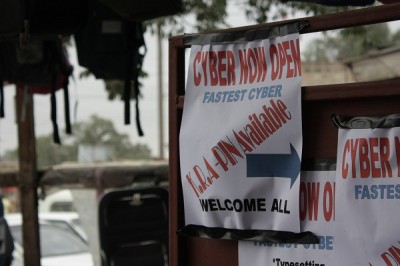Archive for the ‘cyber cafe’ tag
The Digital Divide and the Road to e-Government
Approximately one in every four Kenyans has access to the Internet (Julisha ICT Market Survey, CCK sector statistics ) and half of them get this access at the cyber café. Cybercafe’s therefore play a big role in how Kenyans get online despite the large numbers of mobile internet subscriptions in the country. The vast majority of these Kenyans live in large urban centers or in close proximity to them. These are important facts to keep in mind as the Government and private sector actors push towards the Internet as a channel for service delivery for all.
Government (the democratic sort) is by definition inclusive therefore services offered by democratic governments are predicated on the simple premise that government CAN deliver services to ALL. This is why bridging the digital divide and e-government are joined at the hip. This premise of inclusiveness is a great place to start any conversation about e-governance but also provides a long term challenge to governments in emerging economies/democracies that are implementing e-government strategies for their people. African governments are making progress towards implementation of e-government with countries like Kenya taking transparency online through open data. The Kenyan government also created in 2004 a government department that coordinates e-governance and reports to the Cabinet. Its view on e-government’s role and one of the predetermined goals is articulated on its website as;
“encourage participation of citizens in Government and empower all Kenyans in line with development priorities…” www.e-government.co.ke
The government of Rwanda has won a Technology in Government in Africa Award three times since their launch in 2007 because of its focused implementation of e-government strategy especially in the area of public service delivery.
So what should remain top-of-mind for those developing policy and strategy for e-government in Africa in view of the challenges of maintaining inclusiveness?
- Continued investment in infrastructure. Any conversation about last-mile connectivity within the context of telecentres and cybercafés is of course restricted to facility level infrastructure. However, this infrastructure is for the most part transparent to those sitting behind the keyboard. In addition to the last mile, we need infrastructure that brings connectivity to the citizens finger tips. This is includes actual telecenter/cybercafé facilities that deliver internet services to the people. Incentives such as low cost loans can spur private sector investment in these facilities in places where they don’t exist in sufficient numbers. The Kenya ICT Board has a loan program for telecentre entrepreneurs called the Digital Villages Project or Pasha which is currently in its second cycle. An additional parallel program should be considered to put telecenters in areas where nascent demand exists but return on investment is low at best making them unattractive to investors.
- Caps on pricing of e-government services. A tour of cyber cafes across parts of Kenya earlier this year revealed that it costs more to get a KRA pin in rural areas than it does in the large cities. At KSh200 in Mbumbuni and KSh100 in Mombasa the pricing is skewed in favor of those within walking distance of government offices. Of course walking there may not do you any good as services like those offered by the Kenya Revenue Authority are 100% online (unless KRA invests in some kind of cyber banking hall?). Pricing for e-government services at cybercafés is currently set by the market so capping it at a more accessible level would keep the services within reasonable reach of the masses.
- Incentives for private enterprise – In areas where private enterprise lacks the incentive to invest in last-mile infrastructure or facilities (telecentres/cybercafés/digital villages et al), an incentive policy should be considered such as subsidies on Internet bandwidth, low cost space in government buildings or free technical support to encourage private sector players to make the necessary investments. Invariably, cybercafés play an intermediating role in the provision of these services by providing education and set up for customers. Incentivizing this and encouraging them to keep the services available ensures that the majority who will access e-government services in these places remain included.
Government efforts to ensure the survival of cybercafés through regulation, incentives and price caps should also take into consideration the existing free market environment in order not to create an unfair advantage for a few players.
This is by no means an exhaustive list as there are other considerations that should be given a high share-of-mind. These three, not necessarily listed in order of importance, are simply those I have pondered about in the last few weeks. I’d love to hear more and your opinion of course.
